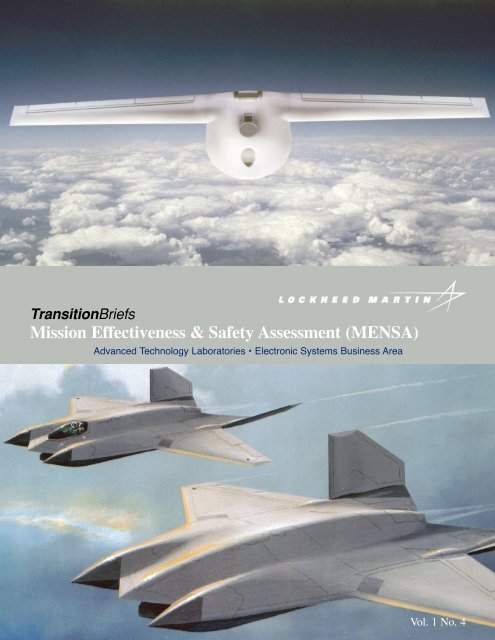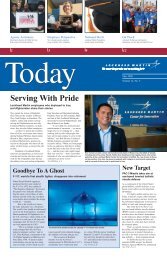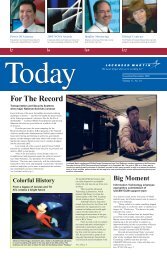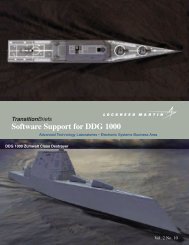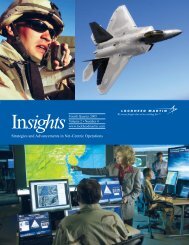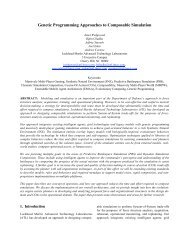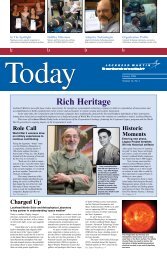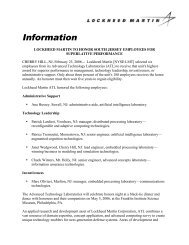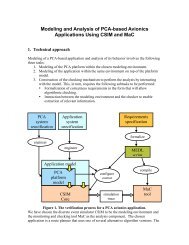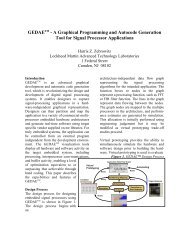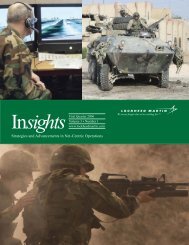Download pdf version - Lockheed Martin Advanced Technology ...
Download pdf version - Lockheed Martin Advanced Technology ...
Download pdf version - Lockheed Martin Advanced Technology ...
You also want an ePaper? Increase the reach of your titles
YUMPU automatically turns print PDFs into web optimized ePapers that Google loves.
TransitionBriefs<br />
Mission Effectiveness & Safety Assessment (MENSA)<br />
<strong>Advanced</strong> <strong>Technology</strong> Laboratories • Electronic Systems Business Area<br />
Vol. 1 No. 4
TransitionBriefs<br />
Mission Effectiveness & Safety Assessment (MENSA)<br />
A major challenge to the operation<br />
of unmanned vehicles is the detection<br />
and resolution of unexpected<br />
events related to the vehicle’s mission.<br />
The mission environment<br />
rarely remains the same from conception<br />
to execution. Similarly, the<br />
vehicle changes as systems<br />
degrade due to operational use.<br />
The difference between success<br />
and failure often relies on properly<br />
and quickly identifying changes in<br />
the environment and vehicle health<br />
and then accurately assessing<br />
their effect on operations.<br />
<strong>Lockheed</strong> <strong>Martin</strong> <strong>Advanced</strong><br />
<strong>Technology</strong> Laboratories (ATL) developed<br />
the Mission Effectiveness and Safety<br />
Assessment (MENSA) technology under<br />
independent research and development<br />
and has transitioned it to multiple target<br />
systems. MENSA is a contingency-monitoring<br />
and plan-assessment architecture<br />
that supports vehicle self-awareness with<br />
respect to the vehicle’s ability to carry out<br />
its missions.<br />
Throughout a mission, MENSA monitors<br />
system health-status indicators and<br />
situation-awareness information to detect<br />
conditions that will impact mission success,<br />
such as degradations to the system’s<br />
operational capabilities or the appearance<br />
of pop-up threats. By raising the level of<br />
monitoring and analysis to account for the<br />
vehicle’s mission performance, MENSA<br />
can focus operator attention on missioncritical<br />
events, increasing the operator’s<br />
situational awareness. Similarly, it can<br />
support increased vehicle autononomy by<br />
facilitating autonomous, dynamic replanning,<br />
which is guided by its identification<br />
of mission-plan dependency violations.<br />
MENSA is an extensible architecture<br />
that supports many design and integration<br />
choices for specific unmanned applications.<br />
It uses XML-based system workflows<br />
and knowledge representations to<br />
help construct applications in multiple<br />
domains, though other representation and<br />
reasoning mechanisms can be substituted<br />
without affecting the overall architecture.<br />
This approach allows MENSA to integrate<br />
and use a wide range of assessment algorithms<br />
in its operation.<br />
Transition Successes<br />
• Intelligent Control and Autonomous<br />
Replanning of Unmanned Systems<br />
(ICARUS). MENSA is part of a comprehensive<br />
software solution to enable<br />
intelligent, autonomous operation of<br />
heterogeneous, unmanned, vehicle<br />
teams that can readily transition at low<br />
risk to current and future Naval<br />
unmanned systems. <strong>Lockheed</strong> <strong>Martin</strong><br />
Aeronautics leads the program.<br />
• KineForce Mission Management<br />
system. MENSA provides the contingency<br />
management component of the<br />
KineForce Mission Manage-ment<br />
system, which arose from the<br />
Unmanned Combat Armed Rotorcraft<br />
(UCAR) program led by <strong>Lockheed</strong><br />
<strong>Martin</strong> Systems Integration-Owego. The<br />
mission management system is now<br />
being used to demonstrate coordinated<br />
mission execution among heterogeneous<br />
teams of aircraft, including the<br />
SilverFox, R-MAX, and Future Combat<br />
System Class II/III aircraft.<br />
• Real-Time MENSA for Unmanned<br />
Aerial Systems. ATL supported the<br />
construction of an embeddable, realtime<br />
<strong>version</strong> of MENSA for integration<br />
with unmanned aerial systems developed<br />
by <strong>Lockheed</strong> <strong>Martin</strong>’s <strong>Advanced</strong><br />
Development Programs unit (Skunk<br />
Works).<br />
Contact:<br />
Hugh Pearce<br />
<strong>Advanced</strong> <strong>Technology</strong> Laboratories<br />
856.792.9810<br />
hpearce@atl.lmco.com


